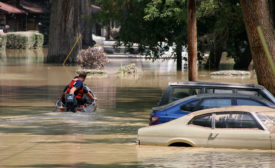Security & Business Resilience
Accounting for Local Hospitals in Emergency Preparedness
Hospital Incident Command Systems (HICS) are a component of security and emergency management that is often overlooked in many of the disaster plans in the United States.
March 1, 2014
How CSOs Can Prepare for Inevitable Natural Disasters
At the core of risk and resilience planning is the ability to gather intelligence and create situational awareness.
January 6, 2014
Sign-up to receive top management & result-driven techniques in the industry.
Join over 20,000+ industry leaders who receive our premium content.
SIGN UP TODAY!Copyright ©2024. All Rights Reserved BNP Media.
Design, CMS, Hosting & Web Development :: ePublishing






